Ward A.W. The Cambridge History of British Foreign Policy. 1783-1919. Volume 3
Подождите немного. Документ загружается.

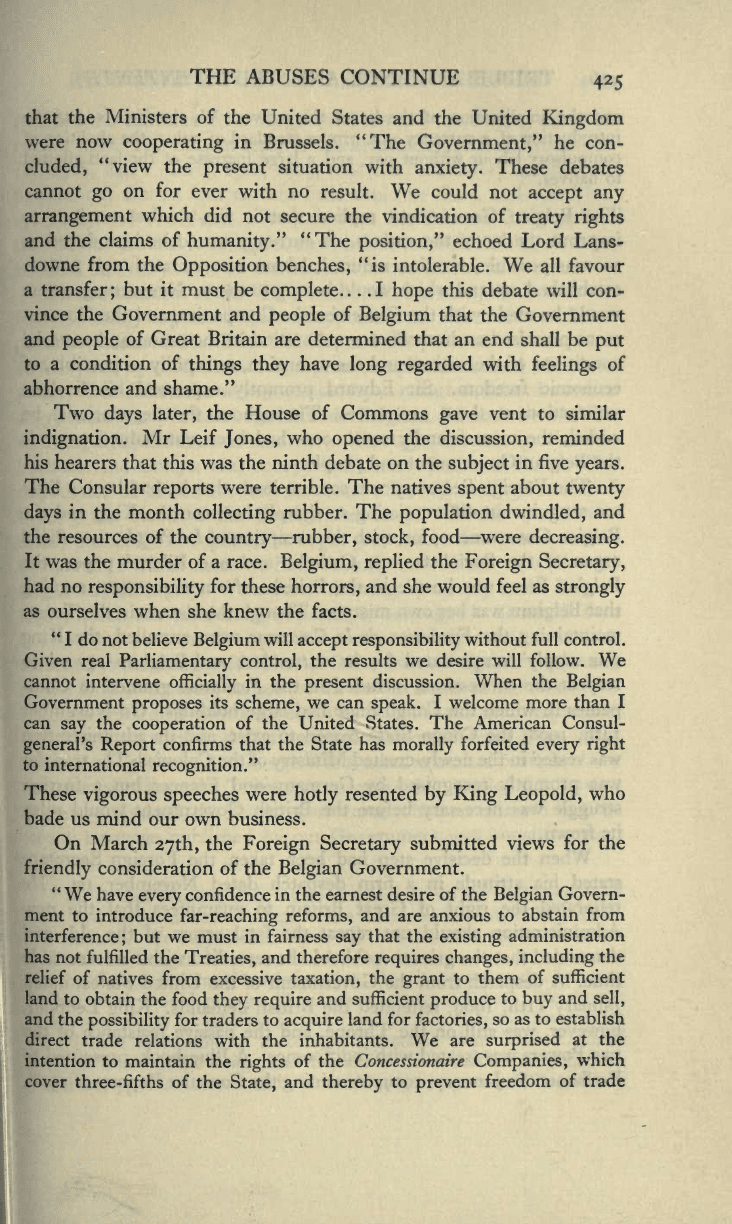
THE ABUSES
CONTINUE
425
that
the
Ministers of
the
United
States and
the United
Kingdom
were
now
cooperating
in
Brussels.
"The
Government,"
he
con-
cluded,
"view
the
present
situation
with
anxiety.
These debates
cannot
go
on
for
ever
with
no
result. We could
not
accept any
arrangement
which
did
not
secure
the
vindication
of
treaty rights
and the
claims of
humanity."
"The
position,"
echoed Lord Lans-
downe
from
the
Opposition
benches,
"is
intolerable. We
all
favour
a
transfer;
but it
must be
complete
I
hope
this
debate
will con-
vince
the Government
and
people
of
Belgium
that
the
Government
and
people
of
Great Britain are determined
that an end
shall be
put
to
a
condition
of
things
they
have
long
regarded
with
feelings
of
abhorrence and shame."
Two
days
later,
the
House of Commons
gave
vent to
similar
indignation.
Mr
Leif
Jones,
who
opened
the
discussion,
reminded
his
hearers
that this
was
the
ninth
debate
on
the
subject
in
five
years.
The
Consular
reports
were
terrible.
The
natives
spent
about
twenty
days
in
the
month
collecting
rubber. The
population
dwindled,
and
the
resources of
the
country
—
rubber,
stock,
food
—
were
decreasing.
It
was
the murder of a race.
Belgium,
replied
the
Foreign
Secretary,
had
no
responsibility
for
these
horrors,
and she would feel as
strongly
as
ourselves when
she
knew
the facts.
"
I do
not
believe
Belgium
will
accept responsibility
without
full control.
Given
real
Parliamentary
control,
the
results we
desire will follow.
We
cannot
intervene
officially
in the
present
discussion. When
the
Belgian
Government
proposes
its
scheme,
we can
speak.
I
welcome
more than I
can
say
the
cooperation
of the
United
States. The American
Consul-
general's
Report
confirms that the State has
morally
forfeited
every right
to
international
recognition."
These
vigorous
speeches
were
hotly
resented
by
King
Leopold,
who
bade
us mind
our own business.
On
March
27th,
the
Foreign
Secretary
submitted
views
for
the
friendly
consideration
of
the
Belgian
Government.
"We have
every
confidence
in
the
earnest
desire
of the
Belgian
Govern-
ment
to
introduce
far-reaching
reforms,
and
are
anxious
to abstain
from
interference;
but
we must
in
fairness
say
that the
existing
administration
has
not
fulfilled
the
Treaties,
and therefore
requires
changes,
including
the
relief of
natives from
excessive
taxation,
the
grant
to them
of sufficient
land
to
obtain
the food
they
require
and sufficient
produce
to
buy
and
sell,
and
the
possibility
for
traders
to
acquire
land for
factories,
so
as
to establish
direct
trade relations with the
inhabitants. We
are
surprised
at the
intention
to
maintain
the
rights
of the
Concessionaire
Companies,
which
cover
three-fifths of
the
State,
and
thereby
to
prevent
freedom
of trade
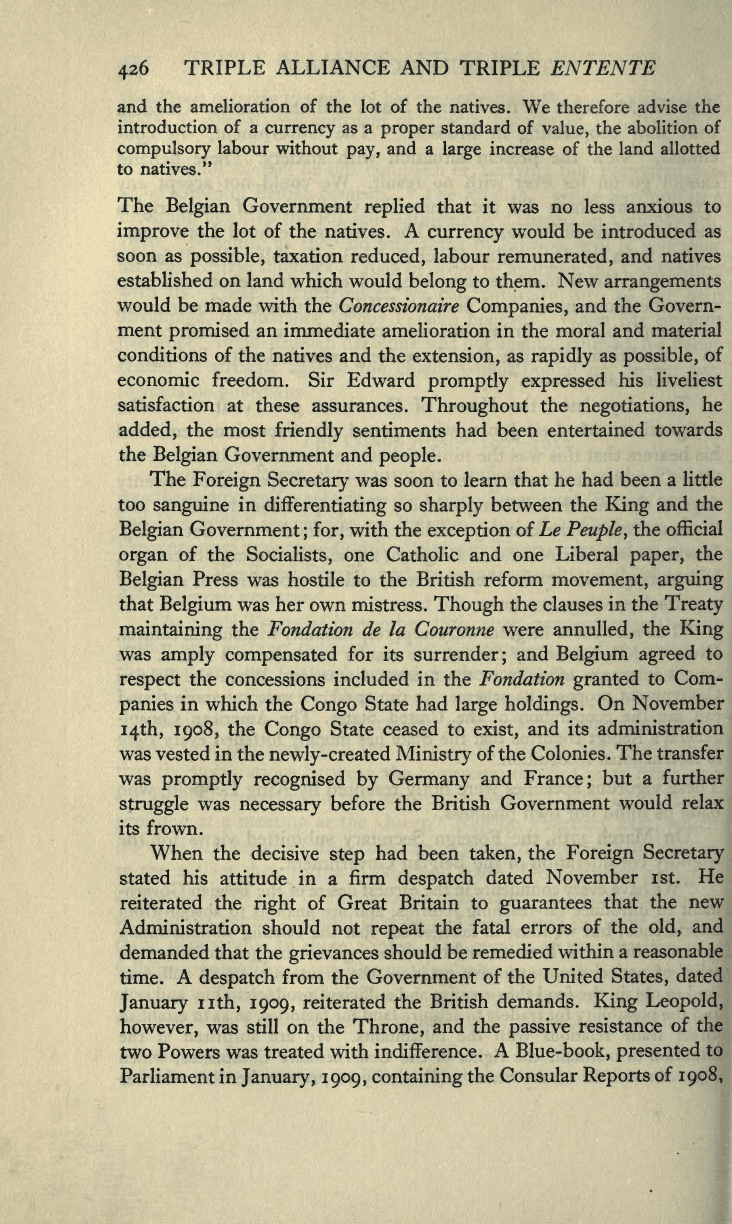
426
TRIPLE
ALLIANCE AND
TRIPLE
ENTENTE
and
the amelioration
of
the lot
of
the
natives.
We
therefore
advise
the
introduction
of a
currency
as a
proper
standard of
value,
the
abolition
of
compulsory
labour
without
pay,
and a
large
increase of the
land
allotted
to
natives."
The
Belgian
Government
replied
that it
was no
less
anxious to
improve
the
lot
of
the natives.
A
currency
would
be introduced
as
soon
as
possible,
taxation
reduced,
labour
remunerated,
and natives
established on
land
which would
belong
to
them.
New
arrangements
would
be made
with
the
Concessionaire
Companies,
and the
Govern-
ment
promised
an
immediate amelioration
in
the
moral and
material
conditions of
the
natives
and
the
extension,
as
rapidly
as
possible,
of
economic freedom. Sir
Edward
promptly
expressed
his
liveliest
satisfaction at
these assurances.
Throughout
the
negotiations,
he
added,
the
most
friendly
sentiments
had been
entertained
towards
the
Belgian
Government
and
people.
The
Foreign Secretary
was
soon to learn that
he
had been
a little
too
sanguine
in
differentiating
so
sharply
between
the
King
and the
Belgian
Government
; for,
with
the
exception
of
Le
Peuple,
the
official
organ
of
the
Socialists,
one
Catholic
and
one Liberal
paper,
the
Belgian
Press was
hostile to the British
reform
movement,
arguing
that
Belgium
was
her own mistress.
Though
the
clauses
in
the
Treaty
maintaining
the Fondation de la Couronne were
annulled,
the
King
was
amply compensated
for its surrender
;
and
Belgium
agreed
to
respect
the
concessions
included in
the
Fondation
granted
to
Com-
panies
in
which
the
Congo
State
had
large
holdings.
On
November
14th, 1908,
the
Congo
State
ceased
to
exist,
and its
administration
was
vested
in
the
newly-created
Ministry
of the
Colonies.
The transfer
was
promptly recognised by
Germany
and
France;
but
a further
struggle
was
necessary
before
the
British
Government
would
relax
its
frown.
When the
decisive
step
had been
taken,
the
Foreign
Secretary
stated
his
attitude
in
a
firm
despatch
dated
November
1st.
He
reiterated the
right
of
Great
Britain
to
guarantees
that
the
new
Administration should
not
repeat
the
fatal
errors
of the
old,
and
demanded that the
grievances
should
be
remedied
within
a reasonable
time.
A
despatch
from
the
Government
of the
United
States,
dated
January
nth,
1909,
reiterated
the British
demands.
King
Leopold,
however,
was still
on
the
Throne,
and
the
passive
resistance
of the
two Powers
was
treated
with
indifference.
A
Blue-book,
presented
to
Parliament
in
January,
1909,
containing
the
Consular
Reports
of
1908,
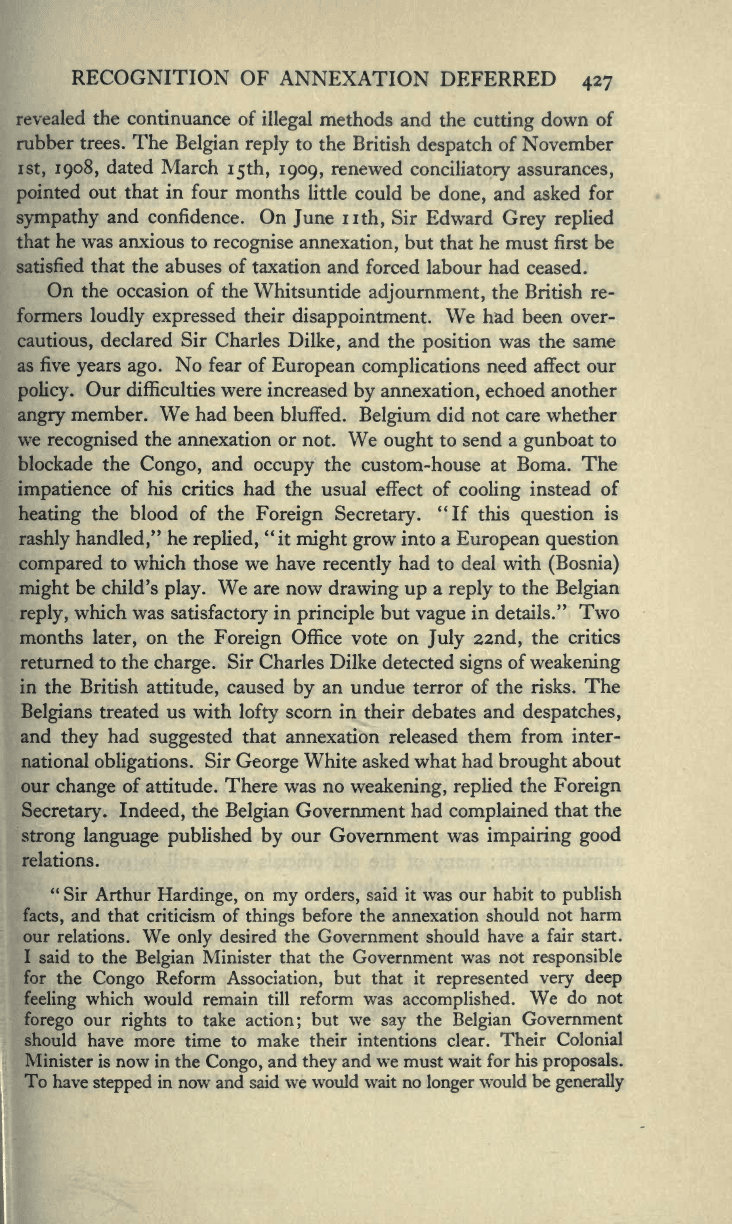
RECOGNITION
OF
ANNEXATION DEFERRED
427
revealed
the
continuance of
illegal
methods and
the
cutting
down
of
rubber
trees. The
Belgian
reply
to the
British
despatch
of
November
1
st,
1908,
dated
March
15th,
1909,
renewed
conciliatory
assurances,
pointed
out
that in
four
months
little
could
be
done,
and
asked
for
sympathy
and
confidence. On
June nth,
Sir Edward
Grey
replied
that
he
was
anxious
to
recognise
annexation,
but that he must
first be
satisfied that the abuses of
taxation and
forced labour had
ceased.
On the occasion of
the
Whitsuntide
adjournment,
the British re-
formers
loudly
expressed
their
disappointment.
We
had
been
over-
cautious,
declared Sir
Charles
Dilke,
and
the
position
was the
same
as
five
years
ago.
No
fear of
European
complications
need affect
our
policy.
Our
difficulties were
increased
by
annexation,
echoed another
angry
member.
We had
been
bluffed.
Belgium
did
not care whether
we
recognised
the annexation or
not.
We
ought
to send
a
gunboat
to
blockade
the
Congo,
and
occupy
the
custom-house at
Boma. The
impatience
of his
critics
had
the
usual
effect
of
cooling
instead
of
heating
the
blood of
the
Foreign
Secretary.
"If
this
question
is
rashly
handled,"
he
replied,
"it
might
grow
into a
European
question
compared
to
which
those
we
have
recently
had
to deal
with
(Bosnia)
might
be child's
play.
We are now
drawing up
a
reply
to
the
Belgian
reply,
which
was
satisfactory
in
principle
but
vague
in
details."
Two
months
later,
on
the
Foreign
Office
vote
on
July
22nd,
the
critics
returned to the
charge.
Sir
Charles Dilke detected
signs
of
weakening
in
the
British
attitude,
caused
by
an
undue terror
of the
risks.
The
Belgians
treated
us with
lofty
scorn in
their debates
and
despatches,
and
they
had
suggested
that annexation released
them
from inter-
national
obligations.
Sir
George
White
asked
what
had
brought
about
our
change
of
attitude.
There was no
weakening, replied
the
Foreign
Secretary.
Indeed,
the
Belgian
Government
had
complained
that
the
strong language published
by
our
Government
was
impairing
good
relations.
"
Sir
Arthur
Hardinge,
on
my
orders,
said it was our
habit
to
publish
facts,
and
that criticism of
things
before
the annexation
should
not
harm
our
relations. We
only
desired
the Government should
have
a
fair start.
I
said to
the
Belgian
Minister
that the
Government
was
not
responsible
for
the
Congo
Reform
Association,
but
that it
represented
very
deep
feeling
which
would remain
till reform was
accomplished.
We
do not
forego
our
rights
to take
action;
but we
say
the
Belgian
Government
should
have more
time
to make
their
intentions clear.
Their
Colonial
Minister
is
now in
the
Congo,
and
they
and we
must
wait
for his
proposals.
10
have
stepped
in now
and
said we
would wait
no
longer
would
be
generally
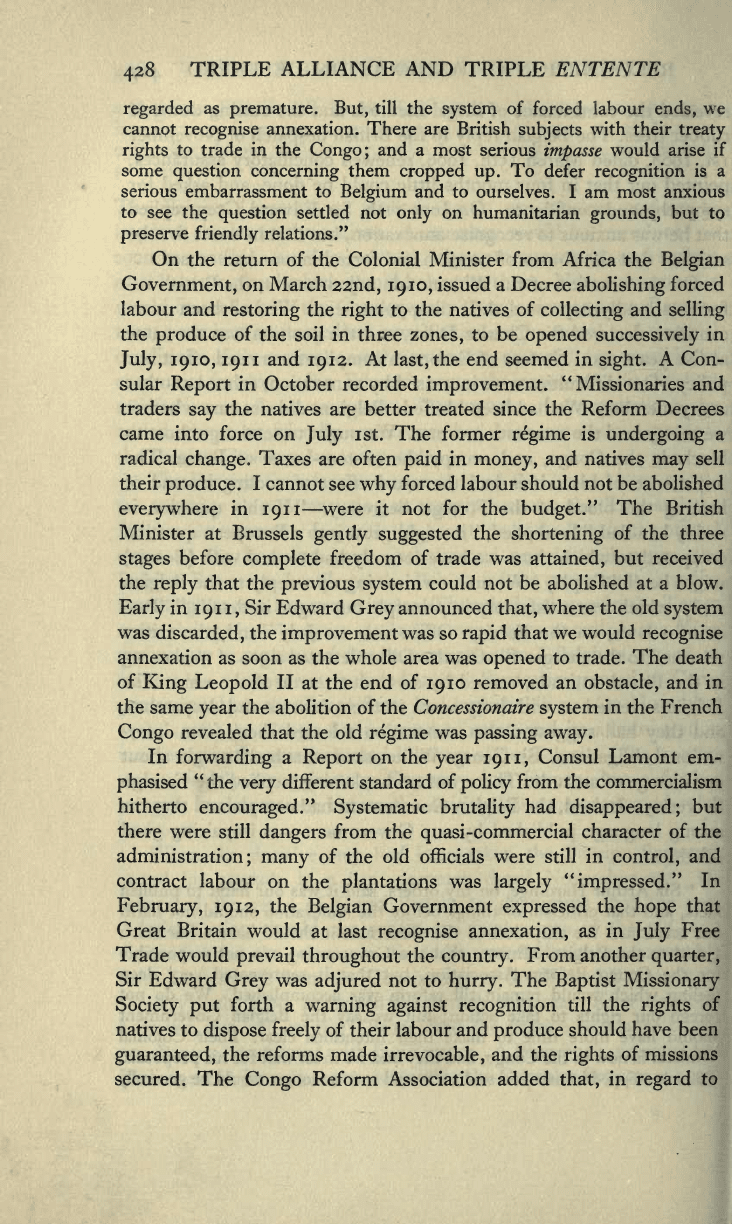
428
TRIPLE
ALLIANCE AND
TRIPLE ENTENTE
regarded
as
premature.
But,
till the
system
of
forced labour
ends,
we
cannot
recognise
annexation. There are British
subjects
with
their
treaty
rights
to
trade
in
the
Congo;
and a most
serious
impasse
would
arise
if
some
question
concerning
them
cropped up.
To
defer
recognition
is
a
serious
embarrassment
to
Belgium
and
to
ourselves.
I
am
most anxious
to
see
the
question
settled
not
only
on
humanitarian
grounds,
but
to
preserve
friendly
relations.'
'
On
the return
of
the Colonial Minister from Africa
the
Belgian
Government,
on
March
22nd,
19
10,
issued a Decree
abolishing
forced
labour
and
restoring
the
right
to the natives
of
collecting
and
selling
the
produce
of
the soil
in
three
zones,
to be
opened
successively
in
July, 1910,
191
1
and
1912.
At
last,
the end
seemed
in
sight.
A Con-
sular
Report
in
October recorded
improvement.
"Missionaries
and
traders
say
the natives are
better
treated since the Reform Decrees
came
into
force
on
July
1st. The former
regime
is
undergoing
a
radical
change.
Taxes are
often
paid
in
money,
and
natives
may
sell
their
produce.
I
cannot see
why
forced
labour should not be abolished
everywhere
in
191
1
—
were it not for the
budget."
The British
Minister at
Brussels
gently
suggested
the
shortening
of
the
three
stages
before
complete
freedom
of
trade
was
attained,
but received
the
reply
that the
previous
system
could not
be abolished at a blow.
Early
in
191
1
,
Sir Edward
Grey
announced
that,
where the
old
system
was
discarded,
the
improvement
was so
rapid
that
we would
recognise
annexation as soon as
the whole area
was
opened
to trade.
The death
of
King
Leopold
II
at
the end
of
1910
removed an
obstacle,
and in
the same
year
the abolition
of
the
Concessionaire
system
in
the
French
Congo
revealed
that the old
regime
was
passing
away.
In
forwarding
a
Report
on
the
year 191
1,
Consul Lamont em-
phasised
"the
very
different standard
of
policy
from
the
commercialism
hitherto
encouraged.'
'
Systematic brutality
had
disappeared;
but
there
were
still
dangers
from
the
quasi-commercial
character
of
the
administration;
many
of
the
old
officials were still
in
control,
and
contract labour on
the
plantations
was
largely
"impressed."
In
February,
19
12,
the
Belgian
Government
expressed
the
hope
that
Great Britain would
at last
recognise
annexation,
as in
July
Free
Trade would
prevail
throughout
the
country.
From another
quarter,
Sir
Edward
Grey
was
adjured
not to
hurry.
The
Baptist
Missionary
Society put
forth a
warning against
recognition
till the
rights
of
natives
to
dispose freely
of
their
labour
and
produce
should
have been
guaranteed,
the
reforms
made
irrevocable,
and
the
rights
of missions
secured.
The
Congo
Reform
Association
added
that,
in
regard
to
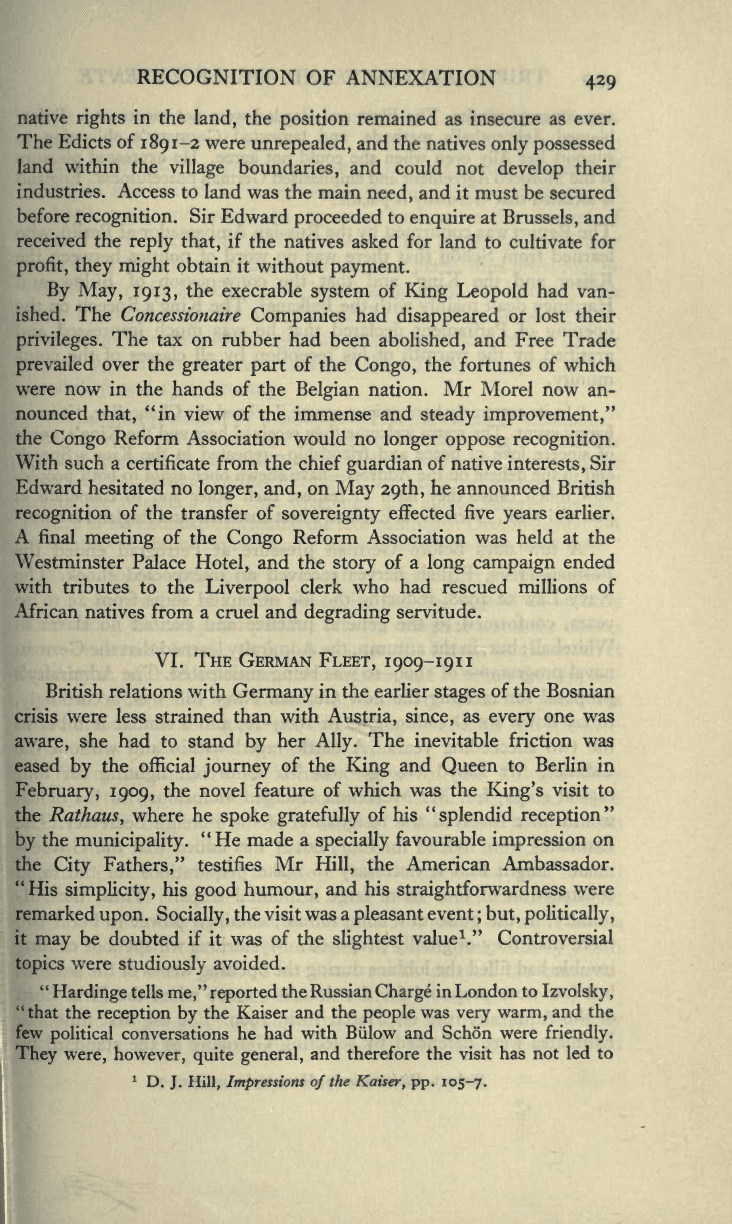
RECOGNITION
OF
ANNEXATION
429
native
rights
in
the
land,
the
position
remained as insecure
as ever.
The
Edicts
of
189
1-2
were
unrepealed,
and
the natives
only
possessed
land
within
the
village
boundaries,
and could
not
develop
their
industries.
Access
to
land
was
the
main
need,
and
it must be secured
before
recognition.
Sir
Edward
proceeded
to
enquire
at
Brussels,
and
received the
reply
that,
if
the
natives asked
for
land
to
cultivate
for
profit,
they might
obtain
it
without
payment.
By May,
19 13,
the
execrable
system
of
King Leopold
had van-
ished.
The
Concessionaire
Companies
had
disappeared
or
lost their
privileges.
The
tax on
rubber had been
abolished,
and Free
Trade
prevailed
over the
greater
part
of
the
Congo,
the fortunes
of
which
were now in
the
hands of
the
Belgian
nation. Mr Morel now
an-
nounced
that,
"in view of
the
immense and
steady improvement/'
the
Congo
Reform
Association would no
longer
oppose
recognition.
With
such a
certificate
from
the
chief
guardian
of
native
interests,
Sir
Edward
hesitated
no
longer,
and,
on
May
29th,
he announced
British
recognition
of
the transfer of
sovereignty
effected
five
years
earlier.
A
final
meeting
of
the
Congo
Reform Association
was held
at
the
Westminster Palace
Hotel,
and the
story
of
a
long campaign
ended
with
tributes to the
Liverpool
clerk
who had
rescued
millions
of
African
natives
from a cruel and
degrading
servitude.
VI.
The German
Fleet,
i
909-19
11
British
relations with
Germany
in the earlier
stages
of
the Bosnian
crisis
were less strained than with
Austria,
since,
as
every
one was
aware,
she had
to stand
by
her
Ally.
The inevitable friction was
eased
by
the official
journey
of the
King
and
Queen
to Berlin in
February,
1909,
the
novel feature
of which was the
King's
visit
to
the
Rathaus,
where
he
spoke
gratefully
of his
"splendid
reception"
by
the
municipality.
"He
made a
specially
favourable
impression
on
the
City
Fathers,"
testifies
Mr
Hill,
the
American
Ambassador.
"His
simplicity,
his
good
humour,
and his
straightforwardness
were
remarked
upon.
Socially,
the visit
was a
pleasant
event
;
but,
politically,
it
may
be
doubted
if
it
was
of
the
slightest
value
1
." Controversial
topics
were
studiously
avoided.
"
Hardinge
tells
me,"
reported
the
Russian
Charge
in London
to
Izvolsky,
"that
the
reception
by
the Kaiser
and the
people
was
very
warm,
and
the
few
political
conversations he
had
with Bulow and Schon
were
friendly.
They
were,
however,
quite
general,
and therefore the visit
has
not led
to
1
D.
J.
Hill, Impressions
of
the
Kaiser,
pp.
105-7.

430
TRIPLE
ALLIANCE AND
TRIPLE
ENTENTE
any
concrete
results.
The
Fleet and
Bagdad
were not mentioned.
Biilow
blamed
Aehrenthal's
methods,
and
lamented
Germany's
obligation
to
support
her
Ally
even when she could not
agree.
He
expressed
pleasure
at
the Morocco
Agreement
and
emphasised
German
peacefulness. England
is satisfied
that
Germany
is
pacific."
The
Report
was confirmed
by
the Russian
Ambassador at
Berlin,
who
learned
from
Schon that
there
was no
word
of
politics
between the
Kaiser
and
the
King,
and
that
the
conversation
of Billow
and
Hardinge
dealt
mainly
with the Balkans
1
. The
King's
Speech
on
the
opening
of Parliament declared
that
he
was much
impressed
and
gratified by
the warmth
of
his
reception
by
all classes
of
the com-
munity.
"
In its
extremely
harmonious
course,"
echoed the
Chancellor,
"
it was a
happy
event.
The warm
welcome
they
received
here
and the
King's
words
of
sincere love
of
peace
and
friendship
—
repeated
in
the
King's Speech
and in
the debate
on
the Address
—
have shewn once
again
to both
peoples
how
much cause
they
have to
respect
each
other
and
to
cooperate
in
peaceful
work.
Germany
is
England's
best
customer,
and
England
is ours."
A
few
days
before
German
pressure
at
Petrograd
ended the
Bosnian
crisis,
British nerves received an
unexpected
shock. The
Navy
Law of
1908, reducing
the
life of
capital
ships
from
25
to 20
years,
conformed
to
the
general
practice
and
excited
no
alarm
in
Whitehall
;
but,
in
the
autumn,
the
Admiralty
learned
that the
German
naval
programme
of
1909-10
was
being
anticipated.
The
Admiralty's
proposal
for
meeting
the new German
Navy
Bill
was,
accordingly,
to
lay
down six
Dreadnoughts
in
1909-10,
and
a similar number
in
the two
succeeding years.
A
battle
raged
within
and
without the
Cabinet,
Mr
Lloyd George
and Mr Churchill
fighting
for four
capital ships;
but
Mr
McKenna
emerged
victorious,
for his
defeat
would
have
involved
the
resignation
of
the
Foreign Secretary.
The
Estimates
were indeed for
four,
but it
was
added
that the
Govern-
ment
"might
find it
necessary
to make
preparations
for the
rapid
construction
of four more
large
armoured
ships."
Thus,
the
Ad-
miralty,
in the
guise
of a
compromise,
obtained
power
to
build
two
more than
they originally
proposed. Mysterious whispers
of
coming
trouble
had filled the lobbies
during
the
opening
weeks
of
the
session
;
but few
were
prepared
for the
dramatic scene
when the First
Lord
of
the
Admiralty
rose
on
March
16th,
1909.
For
the first
time,
the
Estimates
were
defended
by
selecting
Germany
as the standard
by
Siebert,
Diplomatische
Aktenstiicke,
pp.
723-7.
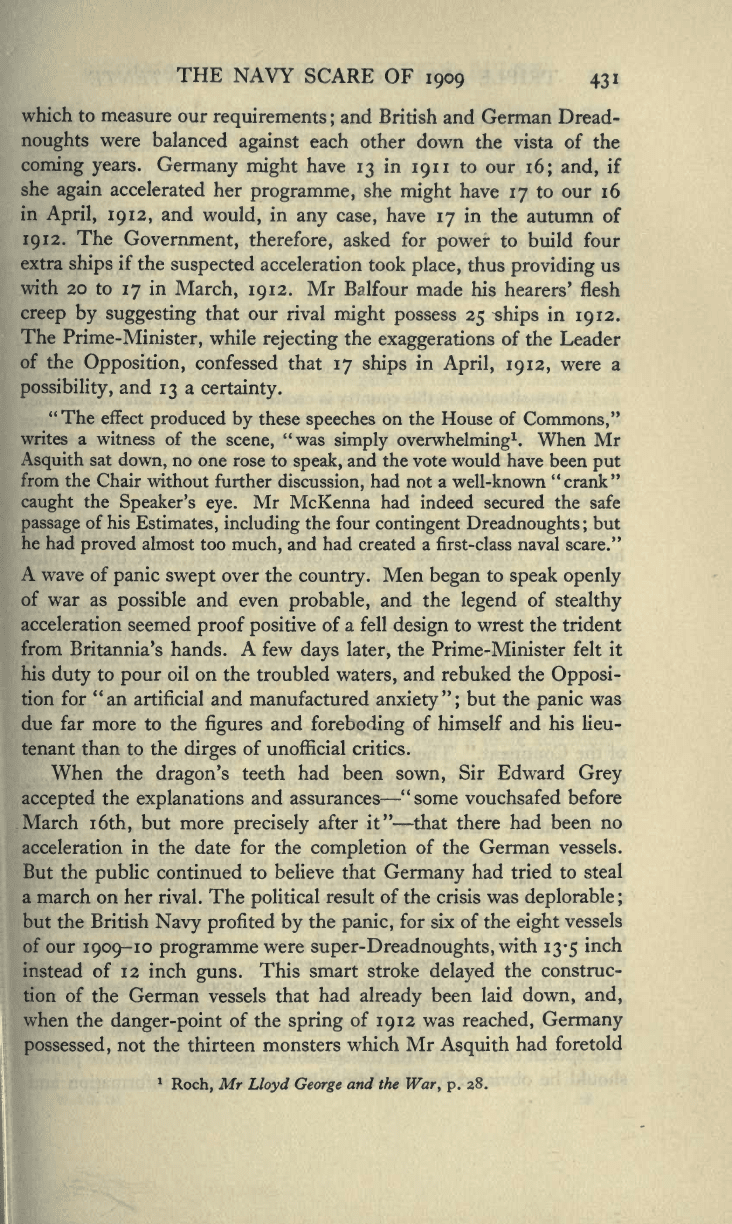
THE
NAVY
SCARE
OF
1909 431
which
to measure
our
requirements
;
and
British
and German
Dread-
noughts
were
balanced
against
each other
down the vista of
the
coming
years.
Germany
might
have
13
in
1911
to our
16;
and,
if
she
again
accelerated
her
programme,
she
might
have
17
to
our
16
in
April,
1912,
and
would,
in
any
case,
have
17
in
the autumn
of
19
1
2.
The
Government,
therefore,
asked for
power
to
build four
extra
ships
if
the
suspected
acceleration
took
place,
thus
providing
us
with 20
to
17
in
March,
1912.
Mr
Balfour
made his
hearers' flesh
creep
by
suggesting
that
our
rival
might
possess
25
ships
in
19
12.
The
Prime-Minister,
while
rejecting
the
exaggerations
of
the Leader
of
the
Opposition,
confessed that
17
ships
in
April,
19
12,
were a
possibility,
and
13
a
certainty.
"The
effect
produced
by
these
speeches
on
the House of
Commons,"
writes a
witness of
the
scene,
"was
simply
overwhelming
1
. When Mr
Asquith
sat
down,
no
one
rose
to
speak,
and
the vote would
have been
put
from
the
Chair
without
further
discussion,
had
not
a
well-known "crank"
caught
the
Speaker's
eye.
Mr
McKenna
had
indeed secured the safe
passage
of
his
Estimates,
including
the
four
contingent Dreadnoughts;
but
he
had
proved
almost too
much,
and
had
created
a first-class naval scare."
A
wave
of
panic
swept
over the
country.
Men
began
to
speak
openly
of
war as
possible
and even
probable,
and
the
legend
of
stealthy
acceleration
seemed
proof positive
of a fell
design
to
wrest
the trident
from
Britannia's
hands.
A
few
days
later,
the Prime-Minister felt it
his
duty
to
pour
oil on
the troubled
waters,
and
rebuked the
Opposi-
tion
for "an artificial and
manufactured
anxiety";
but the
panic
was
due far more
to
the
figures
and
foreboding
of
himself
and his lieu-
tenant than to the
dirges
of unofficial
critics.
When
the
dragon's
teeth had been
sown,
Sir
Edward
Grey
accepted
the
explanations
and
assurances
—
"some
vouchsafed before
March
16th,
but
more
precisely
after it"
—
that there
had been
no
acceleration
in
the date for the
completion
of
the
German vessels.
But
the
public
continued to
believe
that
Germany
had
tried
to
steal
a
march on
her
rival.
The
political
result
of
the crisis
was
deplorable;
but the British
Navy
profited by
the
panic,
for
six of the
eight
vessels
of
our
1909-10 programme
were
super-Dreadnoughts,
with
13-5
inch
instead of
12 inch
guns.
This smart stroke
delayed
the
construc-
tion
of
the German vessels that
had
already
been
laid
down,
and,
when
the
danger-point
of
the
spring
of
19
12 was
reached,
Germany
possessed,
not
the thirteen
monsters
which Mr
Asquith
had foretold
1
Roch,
Mr
Lloyd George
and the
War,
p.
28.

432
TRIPLE
ALLIANCE AND TRIPLE
ENTENTE
as
a
certainty,
but
nine. Mr
McKenna,
on
the
other
hand,
followed
up
his
eight
Dreadnoughts by
five
in
each of
the two
succeeding
years,
thus
completing
in his
three
years
of
office
the
programme
of
eighteen
which he
had
originally
proposed.
On the
day
on which Biilow was
disclaiming
acceleration,
Mr
Arthur
(now
Lord)
Lee moved a Vote of
Censure
on
the Government
for
not
at
once
laying
down
eight Dreadnoughts.
In
a
weighty speech,
the
Foreign
Secretary
replied
that
he
was not sure
that the
four extra
ships
would be
required,
and
that,
in
any
case,
they
need
not
be
ordered before
July,
as
they
could
not be
completed
any
sooner. But
he
made no
attempt
to
disguise
the serious nature
of
the
problem.
"A
new
situation
in this
country
is
created
by
the
German
programme,
whether
it is carried out
quickly
or
slowly.
When
it is
completed,
Germany
will
have a fleet of
33 Dreadnoughts
—
the
most
powerful
the world has
ever seen.
That
imposes
on us the
necessity,
of which
we are
now
at the
beginning
—
except
so
far
as we have
Dreadnoughts already
—
of
rebuilding
the
whole
of our
fleet."
Passing
to the
political
aspect
of the
problem,
he
spoke
calmly
and
hopefully.
Algeciras
was
a
period
of
tension;
but,
since
then,
diplo-
matic
relations
had
proceeded perfectly
smoothly,
and the
new
Agreement
between
Germany
and France
had
removed the
fear
that
the
Morocco
barrier
might
be
reerected. "As
regards
our
future,
I
see
a wide
space
in which
both
of us
may
walk in
peace
and
amity.
Two
things
would
produce
conflict. One
is an
attempt
by
us
to
isolate
Germany.
The other
is
the isolation of
England
attempted
by
any
Great Continental
Power
so
as
to dominate
and
dictate the
policy
of
the
Continent."
There was
no
reason to
apprehend
either the one
or
the other.
The
naval
rivalry
was
the
only
obstacle to confidence.
There
had
been
frank and informal discussions.
We
had
told
Ger-
many
that
the
Navy
was
to
us
what
the
Army
was
to
her.
"
The German view
of
their
programme
is that it is
made
for
their
own
needs
and has no
reference
to
ours; that,
if we build
fifty
or a
hundred,
they
will not
build
more, and,
if
we cease
building, they
will
not build
less.
Our view
is that
our
expenditure
is
and must
be
dependent upon
the
German,
though
the German
is
not
dependent upon
ours.
It is essential
that
we
should
keep
a
position
of
superiority.
... If I was asked to
name
the
one
thing
which
would
most
reassure
Europe
with
regard
to the
prospects
of
peace,
I
think it would be that the naval
expenditure
in
Germany
would
be
diminished and that ours was
following
suit."
The
speech
concluded with the
sensible
suggestion
that
future
panics
should be
obviated
by
the Admiralties
exchanging
information
and
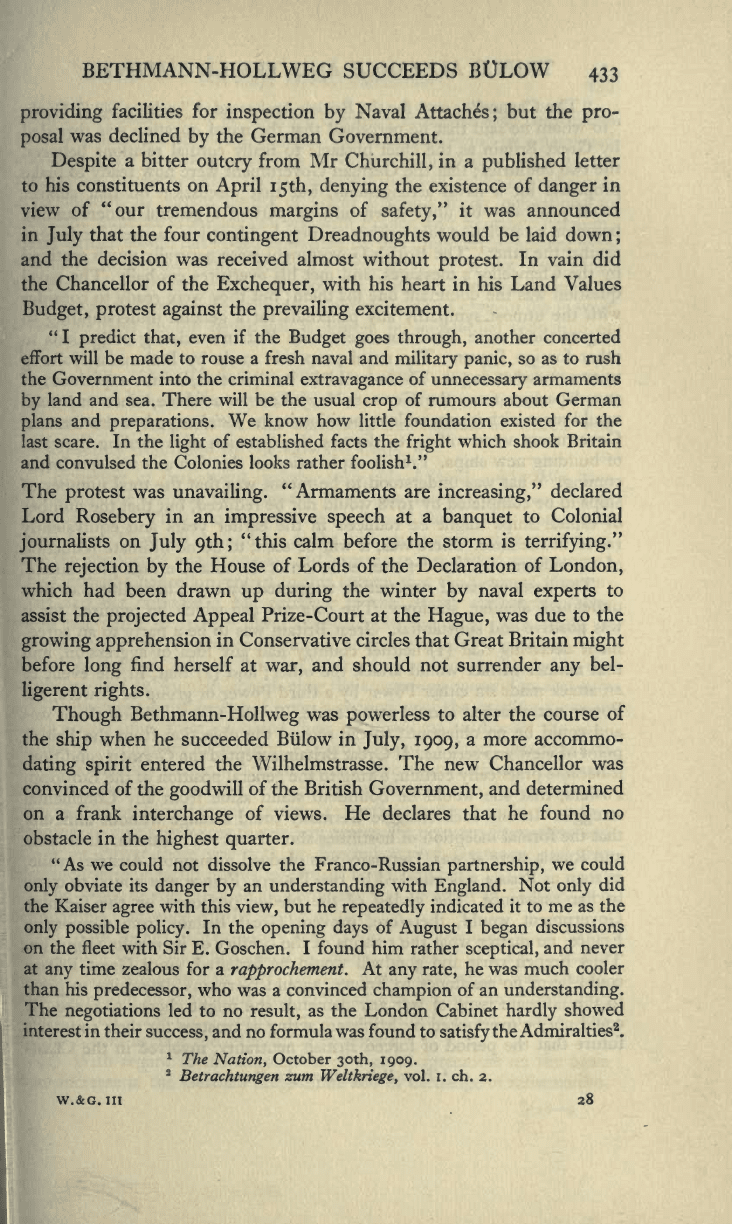
BETHMANN-HOLLWEG SUCCEEDS BOLOW
433
providing
facilities
for
inspection
by
Naval
Attaches;
but
the
pro-
posal
was declined
by
the German
Government.
Despite
a
bitter
outcry
from Mr
Churchill,
in
a
published
letter
to
his
constituents on
April
15th,
denying
the
existence
of
danger
in
view
of "our
tremendous
margins
of
safety,"
it
was announced
in
July
that the
four
contingent
Dreadnoughts
would
be
laid
down;
and the
decision
was received
almost without
protest.
In vain
did
the
Chancellor of
the
Exchequer,
with his
heart
in his
Land
Values
Budget,
protest
against
the
prevailing
excitement.
"I
predict
that,
even if the
Budget goes
through,
another
concerted
effort
will be made to rouse a fresh naval and
military panic,
so as
to rush
the Government into the criminal
extravagance
of
unnecessary
armaments
by
land and
sea. There
will
be the usual
crop
of
rumours about
German
plans
and
preparations.
We know how little foundation existed
for the
last
scare.
In
the
light
of established
facts
the
fright
which
shook Britain
and
convulsed
the
Colonies
looks rather
foolish
1
."
The
protest
was
unavailing.
"Armaments are
increasing,"
declared
Lord
Rosebery
in
an
impressive speech
at
a
banquet
to
Colonial
journalists
on
July
9th;
"this
calm before
the storm
is
terrifying."
The
rejection
by
the
House
of Lords of
the Declaration
of
London,
which had
been
drawn
up
during
the winter
by
naval
experts
to
assist
the
projected Appeal
Prize-Court at
the
Hague,
was due to
the
growing
apprehension
in
Conservative
circles
that
Great Britain
might
before
long
find
herself
at
war,
and should not surrender
any
bel-
ligerent
rights.
Though Bethmann-Hollweg
was
powerless
to alter the
course
of
the
ship
when he
succeeded
Blilow in
July,
1909,
a more
accommo-
dating spirit
entered the
Wilhelmstrasse. The new Chancellor
was
convinced of
the
goodwill
of
the British
Government,
and
determined
on a
frank
interchange
of
views. He
declares that
he
found
no
obstacle
in
the
highest quarter.
"As we could not dissolve the
Franco-Russian
partnership,
we
could
only
obviate its
danger
by
an
understanding
with
England.
Not
only
did
the Kaiser
agree
with this
view,
but
he
repeatedly
indicated
it to
me
as the
only possible
policy.
In the
opening days
of
August
I
began
discussions
on
the
fleet with Sir
E. Goschen.
I found
him
rather
sceptical,
and
never
at
any
time
zealous for a
rapprochement.
At
any
rate,
he
was much
cooler
than
his
predecessor,
who
was
a convinced
champion
of an
understanding.
The
negotiations
led
to no
result,
as the London
Cabinet
hardly
showed
interest in
their
success,
and no formula
was
found to
satisfy
the
Admiralties
2
.
1
The
Nation,
October
30th,
1909.
-
Betrachtungen
zum
Weltkriege,
vol.
1.
ch. 2.
W.&G.
ill
28
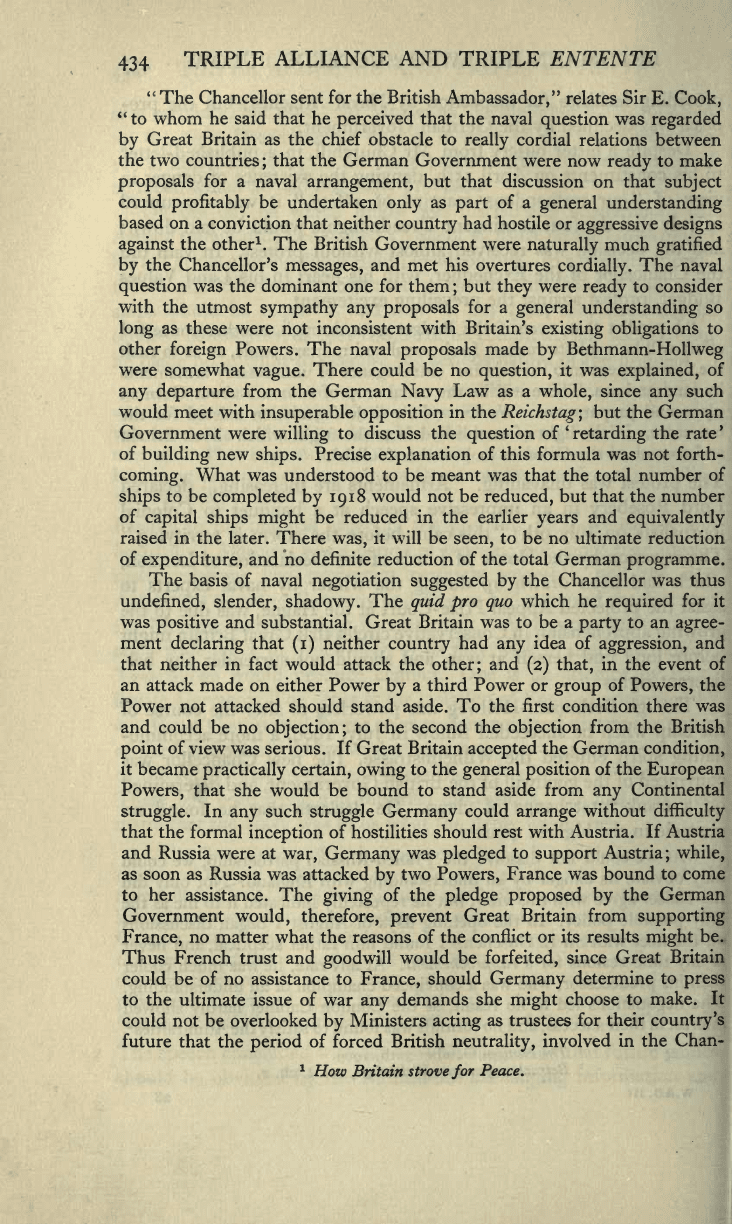
434
TRIPLE
ALLIANCE AND
TRIPLE
ENTENTE
"
The
Chancellor sent
for
the British
Ambassador,"
relates
Sir
E.
Cook,
"to
whom he said that he
perceived
that
the naval
question
was
regarded
by
Great Britain
as
the chief obstacle to
really
cordial relations between
the two
countries
;
that the German
Government were now
ready
to
make
proposals
for a
naval
arrangement,
but that
discussion on that
subject
could
profitably
be
undertaken
only
as
part
of a
general understanding
based on
a conviction that neither
country
had
hostile or
aggressive
designs
against
the other
1
. The British Government
were
naturally
much
gratified
by
the
Chancellor's
messages,
and met his
overtures
cordially.
The naval
question
was the dominant one for
them;
but
they
were
ready
to consider
with
the
utmost
sympathy
any proposals
for
a
general
understanding
so
long
as these
were not inconsistent
with
Britain's
existing obligations
to
other
foreign
Powers. The naval
proposals
made
by
Bethmann-Hollweg
were
somewhat
vague.
There could be
no
question,
it was
explained,
of
any
departure
from
the German
Navy
Law
as
a
whole,
since
any
such
would
meet with
insuperable opposition
in
the
Reichstag
;
but the German
Government were
willing
to discuss the
question
of
'
retarding
the
rate
'
of
building
new
ships.
Precise
explanation
of this
formula
was not
forth-
coming.
What was understood to be meant was that
the
total
number of
ships
to be
completed by
1918
would not be
reduced,
but that the
number
of
capital ships
might
be reduced
in
the earlier
years
and
equivalently
raised in
the later. There
was,
it
will be
seen,
to be
no
ultimate reduction
of
expenditure,
and no definite reduction
of
the
total
German
programme.
The
basis
of
naval
negotiation
suggested by
the
Chancellor
was thus
undefined, slender,
shadowy.
The
quid pro
quo
which he
required
for it
was
positive
and substantial. Great
Britain was to be a
party
to an
agree-
ment
declaring
that
(1)
neither
country
had
any
idea of
aggression,
and
that neither in
fact
would
attack the
other;
and
(2)
that,
in the event
of
an
attack made
on
either Power
by
a third Power or
group
of
Powers,
the
Power
not
attacked should stand aside.
To the first condition there
was
and
could be
no
objection;
to the second
the
objection
from the
British
point
of view
was serious.
If Great Britain
accepted
the German
condition,
it
became
practically
certain,
owing
to the
general
position
of
the
European
Powers,
that she would
be bound to stand aside
from
any
Continental
struggle.
In
any
such
struggle
Germany
could
arrange
without
difficulty
that
the formal
inception
of hostilities should
rest with Austria.
If Austria
and
Russia were at
war,
Germany
was
pledged
to
support
Austria; while,
as soon as
Russia was attacked
by
two
Powers,
France was bound
to
come
to her
assistance. The
giving
of the
pledge
proposed by
the German
Government
would, therefore,
prevent
Great Britain from
supporting
France,
no
matter what
the
reasons of the
conflict or its results
might
be.
Thus
French trust and
goodwill
would be
forfeited,
since Great
Britain
could be of no
assistance to
France,
should
Germany
determine
to
press
to the ultimate issue of war
any
demands
she
might
choose to
make.
It
could not be overlooked
by
Ministers
acting
as
trustees
for their
country's
future that the
period
of
forced
British
neutrality,
involved
in the
Chan-
1
How Britain strove
for
Peace.
